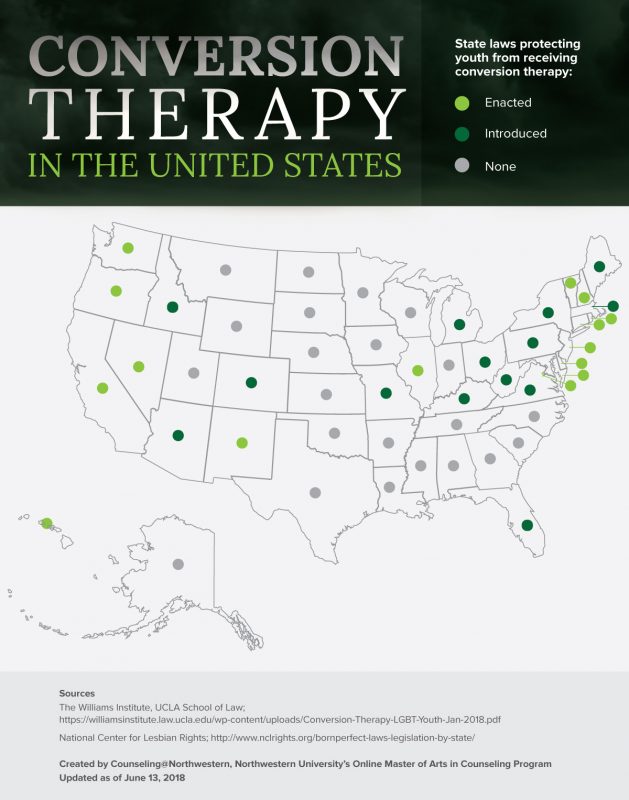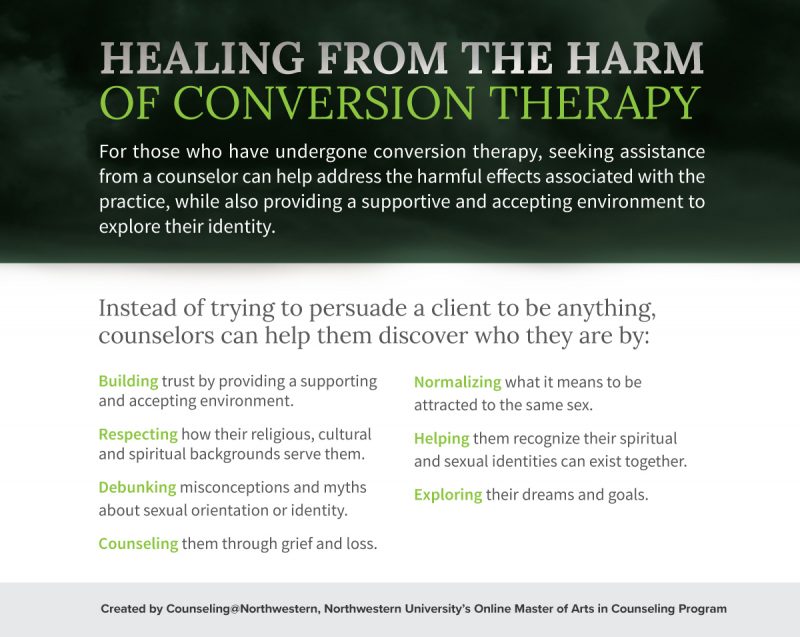It’s a damaging practice that targets the very core of an individual’s identity—and in the United States, it is still legal for minors in 36 states. Conversion therapy is a “treatment grounded in the belief that being LGBT is abnormal … [and] intended to change the sexual orientation, gender identity, or gender expression of LGBT people.” Although there is a growing movement to ban conversion therapy, some mental health professionals aligned with conservative religious groups continue to try to “convert” gay and transgender people—and LGBT youth are particularly vulnerable.
The current landscape of conversion therapy
A recent report by the Williams Institute at UCLA School of Law estimates nearly 700,000 LGBT adults in the U.S. have been subjected to this practice and projects that 77,000 young people 13 to 17 years old will receive conversion therapy before they turn 18.
The mental health community strongly opposes the practice. Richard Yep, CEO of the American Counseling Association (ACA), said a growing wave of legislation banning conversion therapy “will prevent some of our most vulnerable populations—children and youth—from being subjected to a very painful and damaging experience. …The mental health community has spoken in a clear voice that this practice should not be condoned.”
Unfortunately, many who engage in this practice are licensed mental health professionals who offer it under different names, such as “reparative therapy,” to disguise true intent in more acceptable terms. That can make it more difficult to identify those who are practicing conversion therapy and create distrust of the mental health profession.
The harmful effects on children
Research consistently points out how harmful conversion therapy can be. The practice inhibits self-acceptance, which can result in depression, shame, anxiety, self-hatred, social withdrawal and suicidal thoughts.
Dr. Joy Whitman, a core faculty member with the online Master’s in Counseling Program from The Family Institute at Northwestern University, is a licensed professional counselor with expertise on LGBTQ issues. She explains the damage that conversion therapy creates: “It’s trying to change the essence of the person,” she says. “We know that sexual orientation can be fluid. But it’s the coercion to change that is the harmful nature of it. The basic communication is that there is something wrong with you if you are same-sex attracted.”
She notes the harmful effects that are specific to children: “There’s a crisis of identities that’s involved here for clients and a potential loss of family. And there is a deep sense of shame born from religion, society, the educational and legal systems, and the mental health systems,” she says. “Especially for kids, there is a sense of failure in not being able to change that can cause a loss of community and disconnect from family.”
When kids can’t integrate their spiritual faith and sexual identity, the result can be isolation, engagement in opposite-sex behavior as a means of asserting a sexual identity, and intimacy issues. Dr. Whitman emphasizes the need for support systems because adolescents who grow up in these environments may engage in risky behaviors such as substance use.
How mental health professionals can rebuild trust
Dr. Whitman says the dynamics surrounding conversion therapy make it difficult for clients to trust mental health professionals again. “I have to remember that the very profession that I represent has betrayed them. They tried to get help from people that they thought were healers, so I’m very mindful that I will have to work hard to let them know that our work together will be supportive and that I want to understand the conflicts that they have,” she says. “My role with them is not to try to convince them to be anything, but to help them uncover and discover who they are.”
Mental health professionals working with clients who have experienced trauma from conversion therapy can rebuild trust and provide support by adhering to a few principles:
• Provide a supporting and accepting environment.
• Respect how a client’s religious, cultural, and spiritual backgrounds serve them.
• Normalize what it means to be attracted to the same sex.
• Debunk misconceptions and myths about sexual orientation or identity.
• Counsel them through grief and loss.
• Explore their dreams and goals.
• Help them recognize that their spiritual and sexual identities can exist together.
According to Dr. Whitman, much of her work in this realm has focused on normalizing same-sex attraction by breaking down myths and misconceptions—such as the conversion therapy theme that having a normal life isn’t possible in same-sex relationships. She says it’s important to explore a client’s dreams and aspirations and to show them that their spiritual and sexual identities can exist together in a healthy way. “In the past where those identities were dichotomized, I want to help them find a way to be whole.”
Colleen O’Day is a digital marketing manager and supports community outreach for 2U Inc.’s social work, mental health, and education programs. Find her on Twitter @ColleenMODay.
Sources:
Our authors want to hear from you! Click to leave a comment
Related Posts





